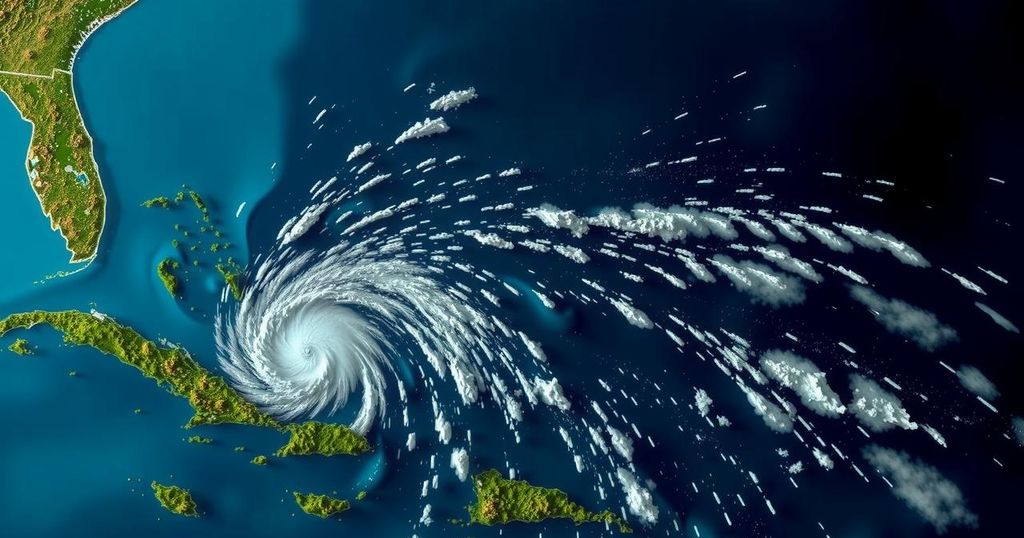Global news
AFRICA, ARKANSAS DEMOCRAT GAZETTE, ASHEVILLE, ATLANTIC, BE, BERMUDA, BRIAN MCNOLDY, CARRIACOU, CUBA, DOMINICAN REPUBLIC, EUROPE/ASIA, EVACUATIONS, FLORIDA, GEORGIA, GRENADA, GULF COAST, GULF OF MEXICO, HELENE, HURRICANE, HURRICANE SEASON, JAMAICA, KATE, NATIONAL HURRICANE CENTER, NATURAL DISASTER, NATURAL DISASTERS, NORTH AMERICA, NORTH CAROLINA, ORLANDO, RAFAEL, SOUTH AFRICA, SOUTH CAROLINA, TAMPA, TENNESSEE, U. S, U. S. GULF COAST, UNITED STATES, UNIVERSITY OF MIAMI, VIRGINIA
Marcus Li
0 Comments
2024 Atlantic Hurricane Season Ends with Record Storms and Devastation
The 2024 Atlantic hurricane season concluded with 11 hurricanes, surpassing the average of seven, amid extensive devastation primarily in the southeastern United States. Notably, Hurricane Beryl broke records for its intensity early in the season, while Hurricane Helene became the deadliest storm since 2005. The season’s patterns suggest an increasing influence of climate change on hurricane formation and intensity.
The conclusion of the 2024 Atlantic hurricane season, marked on Saturday, highlighted the occurrence of 11 hurricanes, surpassing the average of seven, and resulting in significant destruction far from where these storms made landfall along the U.S. Gulf Coast. Meteorologists described this season as particularly tumultuous, attributing the increased activity to unusually warm ocean temperatures. Among the eight hurricanes that made landfall were notable storms affecting various regions, from the U.S. to the Caribbean, leading to severe damage and loss of life.
Hurricane Beryl was particularly remarkable, becoming the first Category 4 hurricane ever recorded to emerge in June, impacting the island of Carriacou in Grenada and later causing devastating crop destruction in Jamaica. The storm escalated to become the earliest Category 5 hurricane in Atlantic history by July 1, breaking traditional seasonal patterns. Major hurricanes are typically expected only after September 1, according to the National Hurricane Center.
In September, Hurricane Helene struck the southeastern United States, causing catastrophic damage and resulting in more than 200 fatalities, making it the deadliest storm since Hurricane Katrina in 2005. North Carolina alone faced an estimated damage of $48.8 billion due to the destruction of homes and vital infrastructure. Other states affected included Florida, Georgia, South Carolina, Tennessee, and Virginia, all suffering extensive damages from the storm’s aftermath.
The month of October experienced Hurricane Milton, which dramatically intensified, reaching maximum wind speeds of 180 mph, ranking it among the strongest hurricanes recorded in the Gulf of Mexico. This region, along with others impacted by Helene, received unprecedented rainfall in September and October, leading to record-high wetness in cities like Asheville, Tampa, and Orlando during this crucial time of the hurricane season.
November concluded the season with Hurricane Rafael, which approached the record for the strongest November hurricane with wind speeds of 120 mph. This storm impacted Cuba, which was still recovering from power outages caused by Hurricane Oscar earlier in October. The rapid warming of oceans due to climate change, associated with greenhouse gases released by human activities, has been identified as a contributing factor to the abnormal intensity and timing of these storms. Brian McNoldy, a hurricane researcher at the University of Miami, emphasized the growing influence of climate change on extreme weather events.
“I do not ever point to climate change as causing a specific weather event, but it certainly has its finger on the scale and makes these extreme storms more likely to occur,” stated Mr. McNoldy.
The 2024 hurricane season underscored the increasing frequency and intensity of hurricanes, reflecting concerning trends attributed to climate change. Meteorological studies indicate that rising ocean temperatures significantly impact cyclone development, leading to more potent storms earlier and later in the season. The implications of these changes are profound, affecting not only weather patterns but also economic stability and human safety along vulnerable coastlines. Understanding these dynamics is essential for future preparedness and mitigation strategies against the escalating threat of hurricanes.
In summary, the 2024 Atlantic hurricane season was characterized by an unprecedented number of hurricanes, leading to substantial loss of life and extensive destruction across various regions. The remarkable intensity of storms like Beryl, Helene, Milton, and Rafael highlighted a shift in seasonal patterns possibly linked to climate change. As the impacts of climate change become increasingly evident, more research and preparedness are essential to address the challenges posed by future hurricane seasons.
Original Source: www.arkansasonline.com




Post Comment